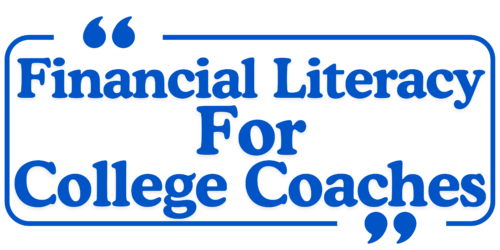General Financial Literacy
- Understand Basic Financial Concepts: Familiarity with essential terms like assets, liabilities, income, and expenses is foundational.
- Set Financial Goals: Establish short-term and long-term financial objectives to guide your financial planning.
- Create a Budget: Develop a budget to track income and expenses, ensuring you live within your means.
Income Management
- Know Your Income Sources: Identify all sources of income, including salary, bonuses, and endorsements.
- Negotiate Contracts: Learn negotiation techniques to secure better terms in your coaching contracts.
- Understand Contract Clauses: Familiarize yourself with key clauses, including termination, severance, and performance bonuses.
Retirement Planning
- Start Saving Early: The earlier you start saving for retirement, the more you benefit from compound interest.
- Choose the Right Retirement Plan: Understand the retirement options available, like 401(k) or 403(b) plans.
- Maximize Employer Contributions: Take full advantage of any employer match on retirement contributions.
Investment Strategies
- Diversify Your Investments: Spread your investments across various asset classes to reduce risk.
- Know Your Risk Tolerance: Assess your comfort level with risk to inform your investment strategy.
- Regularly Review Your Portfolio: Reevaluate your investments periodically to ensure alignment with your goals.
Tax Literacy
- Understand Tax Brackets: Familiarize yourself with how income tax brackets work to optimize your tax strategy.
- Claim Deductions: Learn about deductions available for coaches, such as travel and equipment expenses.
- Plan for Tax Payments: Set aside money for tax liabilities to avoid surprises at tax time.
Credit Management
- Check Your Credit Report: Regularly review your credit report for errors and to understand your credit standing.
- Build Good Credit: Pay bills on time and keep credit utilization low to maintain a good credit score.
- Understand Credit Scores: Know what factors influence your credit score and how to improve it.
Insurance Literacy
- Assess Insurance Needs: Evaluate your insurance coverage to ensure it meets your needs.
- Consider Disability Insurance: Protect your income by considering disability insurance, especially if you rely on your coaching salary.
- Review Liability Insurance: Understand the importance of liability insurance for protecting against legal claims.
Estate Planning
- Create a Will: Having a will is essential for ensuring your assets are distributed according to your wishes.
- Understand Trusts: Learn how trusts can be used for asset protection and estate planning.
- Designate Beneficiaries: Ensure that beneficiary designations on accounts and policies are up-to-date.
Transition Planning
- Prepare for Career Changes: Financially prepare for potential transitions in your coaching career.
- Plan for Retirement Living Expenses: Estimate how much money you’ll need for living expenses in retirement.
- Succession Planning: If you’re a head coach, consider how to pass on responsibilities and leadership to your successor.
Family Financial Literacy
- Involve Family in Financial Planning: Discuss finances with your family to promote shared understanding and responsibility.
- Teach Financial Literacy to Children: Educate your children about money management and savings from an early age.
- Create a Family Budget: Collaborate with family members to develop a budget that reflects everyone’s needs.
Emergency Fund Planning
- Build an Emergency Fund: Aim to save three to six months’ worth of living expenses for unexpected situations.
- Prioritize Emergency Savings: Treat contributions to your emergency fund as a regular expense.
NIL Considerations
- Understand NIL Regulations: Stay informed about NIL laws and how they affect coaches and student-athletes.
- Advise Student-Athletes on NIL Opportunities: Help your athletes navigate contracts related to their name, image, and likeness.
Debt Management
- Manage Student Loans Wisely: Understand repayment options for any student loans you may have.
- Avoid High-Interest Debt: Steer clear of high-interest credit cards and loans that can lead to financial strain.
- Consolidate Debt When Necessary: Consider consolidating debts to lower interest rates and simplify payments.
Miscellaneous Financial Skills
- Keep Learning About Finances: Continuous education on financial topics is crucial for staying informed.
- Seek Professional Advice: Don’t hesitate to consult with financial advisors for personalized guidance.
- Network with Other Coaches: Share financial experiences and strategies with fellow coaches for mutual benefit.
Planning and Strategy
- Create a Financial Action Plan: Develop a clear plan outlining steps to achieve your financial goals.
- Set Regular Financial Check-Ins: Schedule periodic reviews of your financial situation to adjust your plan as needed.
Lifestyle and Spending
- Live Within Your Means: Avoid lifestyle inflation by maintaining your spending habits as your income grows.
- Research Major Purchases: Before making significant purchases, conduct thorough research to ensure you get the best value.
Technology and Resources
- Use Financial Tools: Utilize budgeting apps and investment platforms to streamline your financial management.
- Stay Informed About Financial News: Keep up with economic trends and news that may impact your financial planning.
Long-term Vision
- Plan for Legacy: Consider how you want to be remembered and plan your financial legacy accordingly.
- Stay Flexible with Your Financial Plan: Be prepared to adapt your financial strategies as your life circumstances change.
Mindset and Attitude
- Cultivate a Positive Money Mindset: Develop a healthy relationship with money by focusing on abundance and growth.
- Empower Yourself with Knowledge: Take control of your financial future by educating yourself and making informed decisions.
These takeaways collectively provide a comprehensive framework for college coaches to enhance their financial literacy and make informed decisions that support their financial well-being.
